UnitWherewouldyouliketovisit99
UnitWherewouldyouliketovisit9(00002)

Unit 7 Where would you like to visit?编稿:赵吉存审稿:杭海责编:夏芳莲目标认知重点词汇:1. tiring引起疲劳的、累人的2. educational 有教育意义的、教育的3. peaceful和平的、宁静的4. thrilling 令人激动的、令人震颤的5. fall瀑布6. touristy游客众多的、适合游览的7. consider考虑、认为8. lively活泼的、充满活力的9. sight风景、名胜10. including包括、包含11. tower塔、塔楼12. underground地下的13. general一般事物、一般原则14. wine酒、葡萄酒15. translate 翻译16. light轻的17. wonderful 令人惊叹的、绝妙的18. eastern东部的19. provide 提供、供应20. sail航行21. pacific 太平洋22. finding调查、发现物23. continue继续、坚持24. programming编程25. report报告、汇报26. willing乐意的、志愿的27. dream梦想、做梦28. attitude态度重点词组及句型:1. on vacation 在度假、在休假2. take it easy从容、轻松、不紧张3. in general通常、大体上4. as soon as possible 尽快地5. be willing to 乐意做某事6. quite a few相当多、不少7. dream of梦想、幻想8. hold on to坚持9. come true实现10. provide with 给——提供11. be away离开12. continue doing 继续做某事13. all kinds of各种各样的14. according to 根据1. Where would you like to go on vacation, Sam?萨姆,你想到哪里度假?2. I love the places where people are friendly. 我喜欢人们确实友好的地方。
九级英语UnitWherewouldyouliketovisit教案
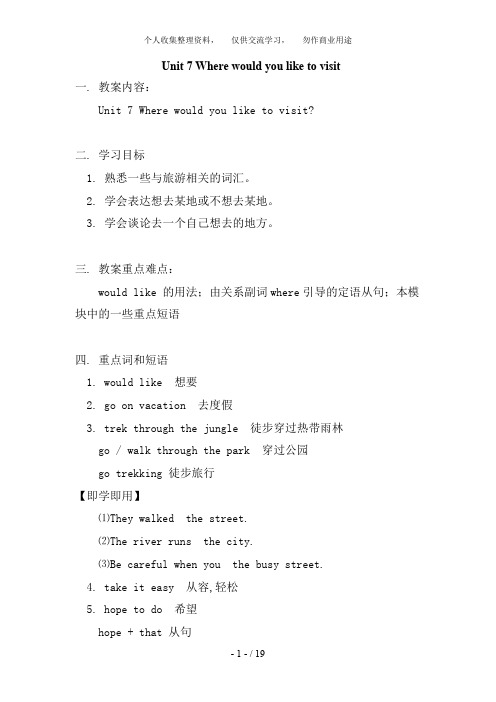
Unit 7 Where would you like to visit一. 教案内容:Unit 7 Where would you like to visit?二. 学习目标1. 熟悉一些与旅游相关的词汇。
2. 学会表达想去某地或不想去某地。
3. 学会谈论去一个自己想去的地方。
三. 教案重点难点:would like 的用法;由关系副词where引导的定语从句;本模块中的一些重点短语四. 重点词和短语1. would like 想要2. go on vacation 去度假3. trek through the jungle 徒步穿过热带雨林go / walk through the park 穿过公园go trekking 徒步旅行【即学即用】⑴They walked the street.⑵The river runs the city.⑶Be careful when you the busy street.4. take it easy 从容,轻松5. hope to do 希望hope + that 从句6. some day (将来)有一天one day (将来)有一天/(过去)一天7. consider doing sth 考虑做某事consider sb. to be sth. 把……视为……consider sb as 认为……【即学即用】⑴I’m considering my hotel, I will come and leave my new address in a few days.A. to changeB. changedC. changeD. changing⑵This book is considered a great help to students of English.A. to beB. beingC. isD. was8. the capital of sp ……的首都 / 省会9. one of the liveliest cities in Europe 欧洲最有活力的城市之一one of the most famous churches in the world 世界上最著名的教堂之一10. fantastic sights 奇妙的景色11. in general 通常12. quite an expensive place 一个高消费的地方13. translate things for sb 为某人翻译事情14. unless 除非【即学即用】⑴除非天气很冷,我爸爸通常开着窗户睡觉。
九年级英语Unit 7 Where would you like to visit
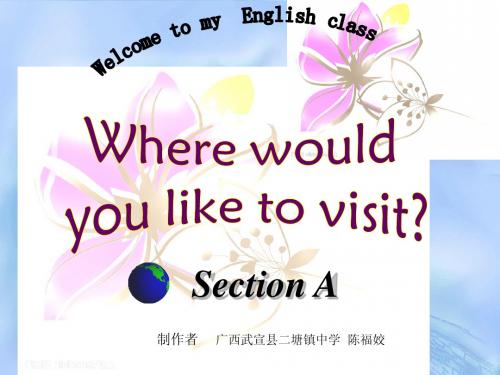
Vacation 1
relaxing
Vacation 2
boring exciting
1b Listen.Where would Sam and Gina like to go on vacation? Why? Fill in the chart. Person Sam Place Brazil Why likes exciting vacations
For example, it has some fantastic sights, including
一些奇异的景观
the Eiffel Tower and Notre Dame Cathedral, one of
埃菲尔铁塔 巴黎圣母院
the most famous Churches in the world.
随堂练习:智力大比拼
用括号中所给词的适当形式填空。 1. We need a peaceful (peace) world.. We hate wars. _______ exciting 2. Sam likes Brazil because he likes________ (excite) vacations. to do 3. There ‘s not much _______(do) in Mexico. consider 4. Why not _____________(consider) visiting Singapore? beaches 5. Paris doesn’t have any ___________(beach) or mountains. shopping 6. Singapore is a wonderful place for ___________(shop). Living 7___________(live) in Singapore is quite expensive. 8. Hong Kong is very _________(crowd). crowdy relaxing 9. I ‘d like to go somewhere ___________(relax.)
人教版九级英语UnitWherewouldyouliketovisit教案
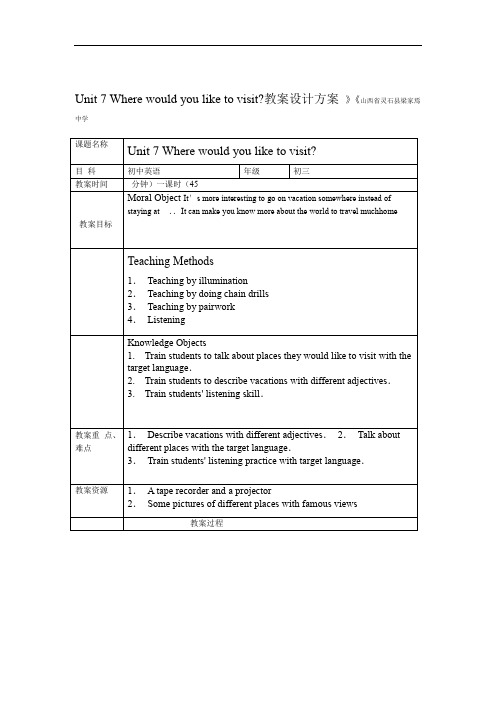
Unit 7 Where would you like to visit?教案设计方案》《山西省灵石县梁家焉中学
修改说明单词的学习放在句中或短语中或是某个情境:在学习过程中,曾有一
位老师讲到中要比单独记单词效果要好,我修订的这部分就是本节课单词新授的环节,原先只是把单词单独放在屏幕上学,修改后是出示图片让学生感受这个单词的意思,教了单词的发音后,就让学生根据图片用这一新单词来说话,因为学生是在用的基础上记单词,这样的效果要比单独教单词好的多。
校本研修过程
4 / 4。
九年级英语Unit 7 Where would you like to visit?

Unit 7 Where would you like to visit?学习目标:1. 熟悉一些与旅游相关的词汇;2. 学会表达想去某地或不想去某地;3. 学会谈论去一个自己想去的地方。
一、词汇1. 生词jungle 热带丛林,密林spotlight 公众注意中心downtown 商业区,中心区customer 顾客,消费者firm 公司spot 地点,场所stele 石碑,石柱intelligence 智力,智慧servant 仆人humanoid 类人动物shape 形状earthquake 地震2. 形容词tiring, educational, fascinating, thrilling, peaceful, exotic, historic, touristy, heavy, private, pack, light, arctic, artificial, doubtful, elderly,electric.二、词组1. go trekking 长途跋涉2. take a trip 去旅行3. consider doing sth 虑做某事4. plan on doing sth 打算做某事5. get around 观光,到处走动6. depend on 依…而定,取决于7. would like(love)to do 想做某事8. go on a vacation 去度假9. provide … with … 应某人某物10. love doing 喜欢做某事11. need to do 需要做某事12. be away 离开13. be supposed to 人们认为三、日常用语1. ---Where would you like to visit?---I’d love to visit Mexico.2. ---What else can you tell me?---I hope to go to France some day.I want to go to somewhere really cool!四、知识讲解Section A:(1)I’d like to trek through the jungle, because I like exciting vacations.我想去热带丛林中旅行,因为我喜欢充满刺激的假期。
初中英语《Wherewouldyouliketovisit》单元教学设计以及思维导图
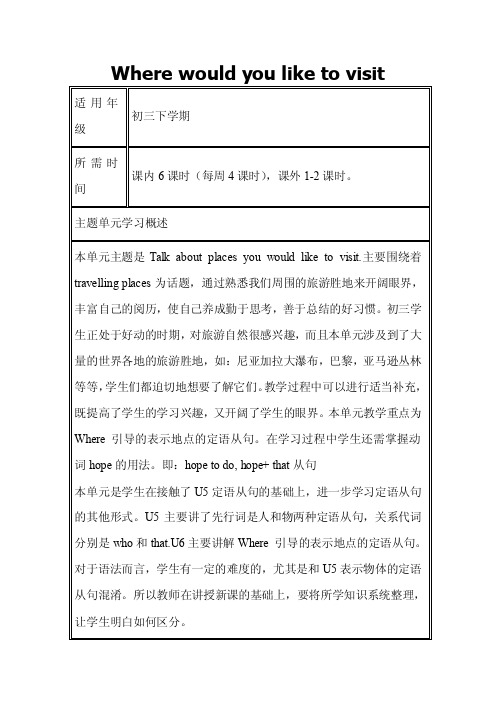
主题单 元问题 设计
1.Where would you like to visit on vacatioon? 2.What do you think of Paris? How do you travel around it? 3.What kind of travel would you like? 4. What are your hopes and dreams? How to achieve them?
Where would you like to visit
适用年 初三下学期
级
所需时 课内 6 课时(每周 4 课时),课外 1-2 课时。
间
主题单元学习概述
本单元主题是 Talk about places you would like to visit.主要围绕着 travelling places 为话题,通过熟悉我们周围的旅游胜地来开阔眼界, 丰富自己的阅历,使自己养成勤于思考,善于总结的好习惯。初三学 生正处于好动的时期,对旅游自然很感兴趣,而且本单元涉及到了大 量的世界各地的旅游胜地,如:尼亚加拉大瀑布,巴黎,亚马逊丛林 等等,学生们都迫切地想要了解它们。教学过程中可以进行适当补充, 既提高了学生的学习兴趣,又开阔了学生的眼界。本单元教学重点为 Where 引导的表示地点的定语从句。在学习过程中学生还需掌握动 词 hope 的用法。即:hope to do, hope+ that 从句 本单元是学生在接触了 U5 定语从句的基础上,进一步学习定语从句 的其他形式。U5 主要讲了先行词是人和物两种定语从句,关系代词 分别是 who 和 that.U6 主要讲解 Where 引导的表示地点的定语从句。 对于语法而言,学生有一定的难度的,尤其是和 U5 表示物体的定语 从句混淆。所以教师在讲授新课的基础上,要将所学知识系统整理, 让学生明白如何区分。
九级Unit英文教案Wherewouldyouliketovisit
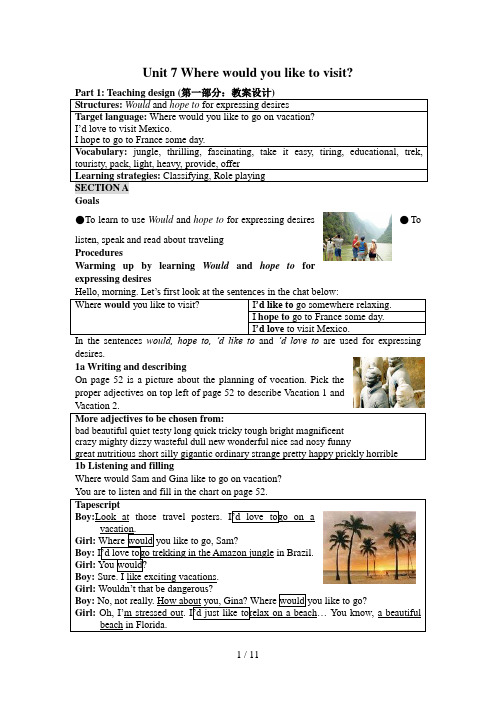
Unit 7 Where would you like to visit?Goals●To learn to use Would and hope to for expressing desires●To listen, speak and read about travelingProceduresWarming up by learning Would and hope to forexpressing desiresdesires.1a Writing and describingOn page 52 is a picture about the planning of vocation. Pick theproper adjectives on top left of page 52 to describe Vacation 1 andWhere would Sam and Gina like to go on vacation?1c Doing pairworkYou are going to practice conversations with your partner according to the vacation posters in 1a.Boy:Do you see those travel posters over there. Let’s goGirl:Boy:Girl:Boy: Sure. I like exciting vacations.Girl:Wouldn’t that be dangerous?Boy:No, not really. How about you, Tian Hong?you like to go?Girl:Oh, I’m stressed out.You know, a beautiful riverside park in Taiyuan.Boy: That sounds peaceful.2a Listening and numberingYou are going to listen to another conversation. This time listen and number the statements on page 53 in the order that you hear them.Now listen to it the second time. Jot down sentences with w ould, hope to, ‘d like toOn page 53 is a chart with “ Place” and “Reason not to visit the place”. Listen againRole play conversations using information from 2a and 2b. You may start this way: A: I hope to visit Hawai some day.B: I do, too. I like places where the weather is always warm.A:I’d like to go on a vacation with my classmate Li Hong.B: I hope to visit Wutai Mountain one day. Would you be interested in going there? A: I like places where the food is really delicious. Zhongqing is a nice place to visit. B: But Zhongqing is too touristy. Maybe we could go to Dali.A:Pingyao would be nice, but we don’t have the time.B:Why don’t we go to Lushan together? It has everything—beautiful views, friendly people, exciting things to do…after class.3b Doing pairworkIn pairs practice the conversation on the middle left of page 54. And then make newB:I’d like to visit Hong Kong.A:Isn’t it supposed to be very crowded?B: Yes, it is. But Kong Kong is also beautiful, and it has lots of great entertainment sights.A: Where would you like to go for the May Day vacation?B:I’d like to see Mexico City.A:Isn’t it supposed to be exciting?B:Yes, it is. But I am going there for a relaxing trip. I don’t have lots to do there.A: Where would you like to visit for the National Day hollidays?B:I’d like to see New York.A:Isn’t it supposed to be very touristy?B: Yes, it is. But it is also a very fascinating place with lots of fantastic galleries.A: Where would you like to spend your Spring Festival vacation?B:I’d like to fly to Sydney.B:Yes, it is. But it is also a very beautiful place withfantastic beaches where you can lie down for a sunbath.A: But you can also lie right here for a free sunbath, too.4 Doing pairworkIn pair you are going to think of a city you know. List thingsyou like and things you don’t like about the city.Terrible DreamI'm feeling rather ragged.I'm feeling rather rough.I'm looking like I stayed up late,and didn't sleep enough.I went to sleep at bedtimeand dreamt all through the night,but when I woke this morningI was feeling far from right.For though I drifted quickly,and slumbered long and deep,I'm totally exhausted'cause I dreamed I couldn't sleep!--Kenn NesbittSECTION BGoals●To practice w ould, hope to, ‘d like to and ‘d love to for expressing desires●To read and write on travelingProceduresWarming up by looking and sayingLook at the picture below and say what the bear wants to say.1 Brainstorming things for vacationAlmost everyone likes traveling, but what things are important to you when you go onJeff is working at a travel agency for the summer vacation. Listen to the conversations and number the pictures on page 55.find out about your vacation packages.On page 56 is an e-mailing message. Read it and check the statements in the chart on , circle the structures for expressing desires, underline the expressionsImagine the you work for Ace Agency. You are to write an email message to S.T.Georgie PorgieGeorgie Porgie, pudding and pie,kissed the girls and made them sigh.He's so cute they stand in linesjust to give him Valentines.--Kenn NesbittSELF CHECK1.Filling blanksOn the top of page 57 is a box with 5 sentences.Read them and fill in a correct given word.(Key: 1. provide 2. cook 3. saving 4. pack 5.hope)Then make your own sentences with each word given.1)hope: “I hope to finish this work tomorrow evening.” “I hope she understands that she cannot expect a raise.”2)pack: “Pack the books into the boxes.” “She packs a gun when she goes into themountains.”3)save: “She saved the old family photographs in a drawer.” “He saves half his salary.” “This move will save money.” “This will save money.”4)provide: “He provides for his large family by working three jobs.” “Provide for the proper care of the passengers on the cruise ship.” “The will provides that each chi ld should receive half of the money.” “The hostess provided lunch for all the guests.” “We provided the room with an electrical heater.”5)cook: “These potatoes have to cook for 20 minutes.” “The apothecary cooked the medicinal mixture in a big iron kettl e.” “Cook me dinner, please.” “Myhusband doesn't cook.”2.Looking and writingOn page 57 are 4 pictures. Write to tell which of theses placesLooking at the pictures below and imagine you are there.Reading: I’d love to sail across the Pacific.Before you read , go over the new words on page 151.While you read , listen to the recording of it, underline all the useful phrases andI. What is travel?Travel is the process of going from one place to another.Most people travel from home to work or school and others travel for fun and sightseeing. Some people write about traveling in books called autobiographies or journals.II. Recommended attractions of Shanxi Province●Yungang Grottoes, Datong●Hengshan Hanging Temple (Xuankong si), Datong●Nine Dragon Screen, Datong●Huayan Si, Datong●Ying Xian Wooden Pagoda, Datong●Mount Hengshan Scenic Spot, Datong●Jin Temple, Taiyuan●Chongshan Monastery, Taiyuan●Qiao's Family Compound (Qiao Jia Dayuan), Pingyao●Wang's Family Compound (Wang Jia Dayuan), Pingyao●Zhenguo Temple, Pingyao●Rishengchang Exchange Shop, Pingyao●Temple of the City God, Pingyao●City Wall of Pingyao, Pingyao●Wall of the Wuzhon mountains, Yungang●Wutai Shan (Five Terrace Mountain), Shanxi●Twin Pagoda Temple (Shuangta si), Taiyuan ●Shuanglin Temple, Pingyao11 / 11。
UnitWherewouldyouliketovisit教案(00001)
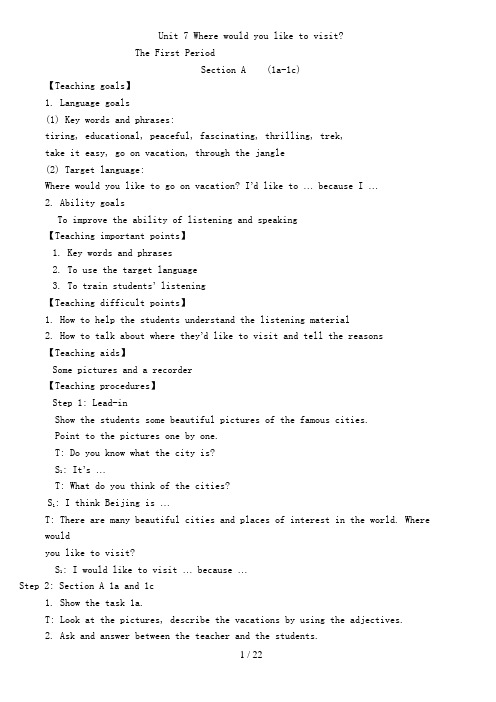
Unit 7 Where would you like to visit?The First PeriodSection A (1a-1c)【Teaching goals】1. Language goals(1) Key words and phrases:tiring, educational, peaceful, fascinating, thrilling, trek,take it easy, go on vacation, through the jangle(2) Target language:Where would you like to go on vacation? I’d like to … because I …2. Ability goalsTo improve the ability of listening and speaking【Teaching important points】1. Key words and phrases2. To use the target language3. To train students’ listening【Teaching difficult points】1. How to help the students understand the listening material2. How to talk about where they’d like to visit and tell the reasons【Teaching aids】Some pictures and a recorder【Teaching procedures】Step 1: Lead-inShow the students some beautiful pictures of the famous cities.Point to the pictures one by one.T: Do you know what the city is?S1: It’s …T: What do you think of the cities?S1: I think Beijing is …T: There are many beautiful cities and places of interest in the world. Where wouldyou like to visit?S1: I would like to visit … because …Step 2: Section A 1a and 1c1. Show the task 1a.T: Look at the pictures, describe the vacations by using the adjectives.2. Ask and answer between the teacher and the students.How is Vacation 1? How is Vacation 2?3. The students express their opinions.4. Make conversations in pairs.Sample dialogue:A: Where would you like to visit? Why?B: I would like to trek though the jungle because it’s exciting.5. Ask some pairs to act it out.Step 3: Section A 1b1. Show the task1b.T: You’ll hear a conversation between Sam and Gina. They’re talking about where theywould like to visit. Read the instructions first, then listen to the tape.2. Play the recording. Students only listen this time.3. Play the recording again. Students fill in the chart.4. Check the answers.Step 4: Post-task1. Show the students a table on a small blackboard.Use some adjectives to describe the vacations.2. Practice in pairs.Where would you like to visit? Why?Step 5: Group workGive every group (four students) some famous places in or near Wanzhou, such as Qinglong Fall, Tanzhang Gorge, ZhangfeiTemple, TaibaiPark. Ask and answer each other.Sample dialogue:A: Where would you like?B: I would like to visit …because it’s …Where would you like to visit?C: I would like to visit … because it’s …How about you?D: I would …Step 6: SummarySum up the main target language.Step 7: HomeworkAsk the Ss to write something about a beautiful place of Wanzhou.The Second PeriodSection A (2a-2c)【Teaching goals】1. Language goals(1) Key words and phrases:fall, some day, somewhere, relaxing, some day, hope to do sth.(2) Target language:The attributive clause, such as:I like the places where the weather is always warm.2. Ability goals(1) To train the students’ listening skill(2) To teach the students how to use the attributive clause【Teaching important points and difficult points】1. Listening practice2. The attributive clause【Teaching procedures】Step 1: Revision and lead-inShow the students some maps, then work in pairs.A: Where would you like to go on vacation? Why?B: I’d like to … because it’s …Check some pairs.Step 2: Section A 2a and 2b1. Show the tasks.T: Now we’ll listen a dialogue among three kids. What are they talking about? Where would they like to go? Listen carefully and find out the results.2. Play the recording once with books closed. (Maybe many students can’t understand it.)3. Show the listening material with some missing blanks on a small blackboard. Ask the students to listen again while they’re reading it. Play the recordingtwice,.(Doing it like this can make the task easier.)Boy 1: Wouldn’t it be great ______________________________?Girl 1:Yeah. _____________________!Boy 1: ____________________?Girl 1: Well, I hope to visit ___________. Would you be interested in going there? Boy 2: Sure! I like places ______________________ .Boy 1: But Hawaii is too _____. Maybe we could go to Mexico. I love places________.Boy 2: Well, Mexico would be nice, but ________________. I hope to see Niagara Falls ________ .What about going there?Girl 1: Niagara Falls would be ___________, but there’s not much ___________. Why don’t we all go _______________? It has everything - beautiful views, friendly people, exciting things to do …Boy 2: That’s __________ … if you pay for it!4. Play the recording again. Ask the students to listen and read the material on the small blackboard.5. (The students’ books are open.) Listen to it another twice, finish off 2a and2b.6. Check the answers.7. Listen and repeat with books closed.8. Read the tape scripts aloud with books open.9. Explain some sentences, such as:(1) I like places where the weather is always warm.(2) I hope to seeNiagara Fallssome day.(3) Would you be interested in going there?Step 3: Section A 2c1. Show the task. Use the information in 2a and 2b to role play conversations. Work in pairs.2. Check some pairs.Step 4: Post-task1. Show the students some vacation plannings.Such as: visit Beijing, climb a hill, go to the beach, discuss in groups.A: Where wouldn’t you like to go? Why?B: I wouldn’t like to go … because it’s (not) …2. Check the groups’ work.Step 5: ExercisesChoose the right answers:1. I’d like to trek ______ the jungle.A. throughB. acrossC. overD. on2. He felt excited about ______ the city.A. to get aroundB. get aroundC. getting aroundD. whether go or not3. My parents want to go ______ for vacation.A. somewhere peacefulB. dangerous somewhereC. somewhere boringD. fascinating somewhere4. This is the factory ______ we worked last month.A. thatB. whichC. whereD. there5. This is the factory ______ we visited last month.A. thatB. in whichC. whereD. thereStep 6: Summary and homeworkThe Third PeriodSection A (3a-4)【Teaching goals】1. Language goals(1) Key words and phrases(2) Target language2. Ability goalTo train the students’ speaking and reading skills3. Moral goalsTo encourage the students to express their opinionsTo talk about the places they like or dislike freely【Teaching important point and difficult point】To discuss the places they like or dislike【Teaching procedures】Step 1: Revision and lead-in1. Talk about some cities. Ask the students to work in groups.Sample dialogue:A: Where would you like to go? Why?B: I like to go to Beijing because it’s our capital.C: I wouldn’t like to go to Beijing because it may cost much money and it’s too crowded.D: I would (wouldn’t) …2. Check the groups’ work.Step 2: Section A 3aT: OK. There are some places where someone wants to go but others don’t. Now, we’ll listen and read an article about a place like this. Do you know what it is? Now open your books, listen and answer these questions.1. Play the recording, listen and read silently. Answer the question. (It’s Paris.)2. Ask the students to circle the things they like and underline the things they dislike.3. Check the answers.4. Ask the students to answer the following questions:(1)Where is Paris?(2)Does it have mountains?(3)Is it cheap or expensive to travel by taxi?(4)What’s not expensive?(5)Do people in Paris like to speak English?(6)Would you like to visit Paris? Why or why not?5. Explain some important and difficult words, phrases and sentences.6. Listen to the tape and repeat.7. Ask some students to introduce something about Paris.8. Read the article aloud.Step 3: Section A 3b1. Show the task. Read the conversation and the information in the box.2. Work in pairs. Make and practice the conversations.3. Check the pairs’ work.Sample dialogue 1:A: Where would you like to go?B: I’d like to visit Hong Kong. It’s very interesting.A: Isn’t it too crowded?B: Yes, but I think the people are friendly. We’re all Chinese.Sample dialogue 2:A: Where would you like to visit?B: I’d like to visit New York. I have never been abroad. It must be interesting. A: Can you speak English well?B: I’m a little worried about it. I think I should learn English harder.Step 4: Section A 41. Ask the students to talk about Chongqing. Fill in the blanks.2. Check the answers.Step 5: Summary and homework1. Sum the important words and phrases.2. Sum the target language.The Fourth PeriodSection B (1-3c)【Teaching goals】1. Language goals(1) Key words and phrases(2) Target languages:Where would you like to go?I’d like to go somewhere warm.2. Ability goalTo train the students’ listening skill3. Moral goalTo encourage the students to make their own decision what kind of vacation they would like【Teaching important points and difficult points】1. To help the students practice listening2. Key words and target language【Teaching procedures】Step 1: Revision and lead-in1. Ask the students to work in pairs. Talk about where they would like or wouldn’t like to go and tell the partner the reasons.2. Ask some students like this:T: Where would you like to go? What kind of place would you like to go?S: I would like to go to a beach.1I would like to go somewhere near the ocean.: I would like to go to Shenzhen.S2I would like to go somewhere warm.: I would like to go to a park.S3I would like to go somewhere that’s fun for kids.: I would like to go somewhere we can do lots of outdoor activities.S43. Ask the students to discuss in pairs.Step 2: Section B 11. Show the task, then read the instructions to the class.2. Ask the students to spend three minutes writing down a list of things that are important to them when they go on vacation.3. Ask the students to communicate in groups.4. Ask some students to read their lists to the class.Step 3: Section B 2a and 2b1. Show the task. Read the instructions to the class.2. Point to the three pictures.T: Jeff works at a travel agency. You will hear him talking on the phone with three different people.3. Show the listening material with some missing blanks on a small blackboard. Ask the students to listen again while they’re reading it. Play the recording twice.4. Play the recording again. Ask the students to repeat, at the same time they’re reading the material on the small blackboard.5. (The students’ books are open.) Listen to it another twice, finish off 2a and2b.6. Check the answers.7. Listen and repeat with books closed.8. Read the tape scripts aloud with books open.Step 4: Section B 2c1. Show the task. Read the instructions to the class.2. Point to the sample conversation in the box. Read it together.3. Work in pairs or groups. Move around the room checking the progress of the pairs and offering help as needed.4. Ask some pairs or groups to present their conversations.Step 5: Post-taskComplete the survey.Step 6: Exercises1. My father likes to watch basketball matches on TV. (改为否定句)My father ________ ________ to watch basketball matches on TV.2. I like to collect toys because they are beautiful. (对划线部分提问)________ _______ you like to collect toys?3. Students can’t take magazines out of the reading-room. (改为被动语态) Magazines can’t _______ _______ out of the reading-room by students.4. Mike is 14 years old. David is 12 years old. (合并为一句)Mike is 2 years ________ ________ David.5. Alice didn’t know how she could draw horses well. (改为同义句)Alice didn’t know how ________ l________ horses well.Step 7: SummaryStep 8: HomeworkThe Fifth PeriodSection B (3a—4)【Teaching goals】1. Language goals:(1)Key words and phrases(2)Target language2. Ability goals(1)To train the students’ reading skill(2)To train the students’ writing skill3. Moral goal:To make the students know how beautiful our country is【Teaching important points and difficult points】1. To train the students’ reading and writing skills2. Key words and phrases【Teaching procedures】Step 1: Revision and lead-in1. Work in groups. Express their opinions: “I would like to go somewhere …” in his/her group.2. Play the recording of 2a and 2b. Listen and repeat with books closed.Step 2: Section B 3aT: There is another people who is asking Ace Travel for help. What kind of vacation does he want? Today we’ll learn 3a. Open your books on page 56. Let’s listen carefully and answer the questions on the blackboard.1. Play the recorder. Listen and read silently.2. Read the passage again, answer the questions on the blackboard.(1)Where do they want to take a trip this summer?(2)Do they mind the distance?(3)What do they especially like?(4)How can they save money?(5)How long can they be away?(6)What do you think of his trip?3. Ask the students to write “T”, “F” or “DK” for the sentences on the book.4. Check the answers.5. Explain the key words, phrases and sentences:(1)somewhere in eastern China(2)We don’t mind how far we have to go.(3)It has to be a place where we can do lots of activities.(4)big enough(5)by cooking our own meals(6)be away6. Listen and read the passage aloud.7. Ask the students to retell the article.Step 3: Section B 41. Read the instructions to the class.2. Work in pairs. Ask a pair of students to model the sample conversation.3. Check all the pairs.4. Work in groups. In a group (four students) one student surveys the other three students.5. Ask a few students to tell the class about which places their groups agree are the best places to go.Step 4: ExercisesChoose the right answers:1. He isn’t the boy______.A. we are waitingB.who we are waiting forC. which we have waitedD.who are waited2. I’ll tell you _____ he told me last night.A. all whichB. all whatC. that allD. all3. Why not consider ____ Kunming next holiday?A. visitB. visitedC. visitingD. visits4. This is the museum _____ the exhibition was held.A. whereB. thatC. on whichD. the one5. How long do you suppose _____?A. would she stay hereB. will they be hereC. he will leave hereD. she would be away6. Is this the museum _____ you visited a few days ago?A. whereB. thatC. on whichD. the one7. Taiwan is _____ the east of Fujian, and it is _____ the east of China.A. in。
新目标九级UnitWherewouldyouliketovisit教案
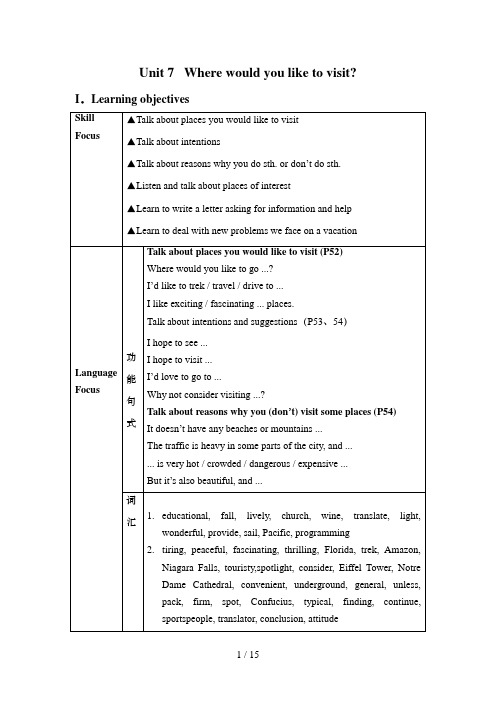
Unit 7 Where would you like to visit? I.Learning objectivesIII. Teaching plans for each periodPeriod 1Language goals1. Words && expressionstiring, relaxing, educational, peaceful, jungle2. Key sentences (P52)Where would you like to go on vacation, Sam?Ability goalsEnable the Ss to talk about places they would like to visit.Emotion && attitude goalsEnable the Ss to love the nature.Strategy goalsListening for key words.Culture awareness goalsLearn about some scenery spots around the world.Teaching important points Talk about places you would like to visit and the intentions.Teaching procedures and ways Step I Lead-in (1a:P52)T: Have you ever been to the Great Wall?S1: Yes, I have been to.S2: No, I have never been to.T: I have been to the Great Wall. Last summer I visited it. I like the Great Wall very much. Besides, I would like to visit the SummerPalace. How about you?S3: I’d like to visit Qingdao next summer vacation.S4: I would like to pay a visit to Xi’an.T: I’d like to visit the SummerPalace, because it’s exciting.Write the word “exciting” on the blackboard.T: Do you know what this word really means? Can you think of something else that is exciting? I will give you some clues. For example, it was an exciting day when I went swimming with my friends.S5: Yes, I guess it means something that makes us happy. We can say that collecting stamps, going swimming and going shopping are all exciting.T: Good. That’s right. Do you know which words have the opposite meaning?S6: “Boring” is just the opposite of “exciting”, I think.T: Yes, Good. Can you make a sentence with these two words?S6: Yes, let me try. Having a vacation is exciting while playing chess is boring.T: You did a good job. Can you give me some words to describe a vacation?Then list the words “tiring”, “educational”, “peaceful”, “relaxing”, “thrilling” and “fascinating” on the blackboard.T: Most of you have been to different places for your vacations. Some places are relaxing, while some may be thrilling and dangerous, so we must be careful on our trip. Now please open your books to page 52 and look at the posters in the picture, what can you see in the posters?S7: In the first poster I can see a beach and a man lying on it.T: Can you read the words?S7: Yes. Take it easy on a FloridaBeach!T: Then if you are asked to give a brief description of the beach, which words would you like to use?S7: I think the beach is fascinating, peaceful and exciting.T: Very good, sit down. And who would like to say something about the second poster? S8: Let me try. In the second poster we can see a man holding a knife. This is a poster for a travel to Brazil. I think trekking through the Amazon jungle is dangerous and thrilling, but at the same time, it is exciting.Step II Listening (1b: P52)Ask the Ss what they should do before listening.T: What should you do if you are going to do some listening practice?S9: I think we should know, first, what we are asked to do.T: Then what you are asked to do according to the instruction in 1b?S10: To fill in the chart with the places that Sam and Gina would like to go to on vacation and the reasons.T: Good. From the chart we can see Sam wants to go to Brazil because he likes exciting vacations. Do you know where Gina wants to visit? And why? What’s more, sometimes you’d better write some key words on the paper while you are listening.Ask the Ss to listen to the tape, finish the exx. and then check the answers.Step III Pairwork (1c: P52)T: Now please work in pairs. Suppose you two are the persons in the picture in 1a. Make conversations to tell your partners the place you would like to visit, the Florida beach or the Amazon jungle of Brazil? Why?S2: I’d like to trek through the jungle. I think it must be very exciting to trek through the jungle, though it is to some extent dangerous and thrilling. What about you? Step IV HomeworkAsk the Ss to:1. do more practice as required in 1c on page 52.2. prepare for the next period: Think about a good place you want to travel to.Period 2 PracticeLanguage goals1. Words && expressions Niagara Falls, touristy,consider, lively, Eiffel Tower, Notre Dame Cathedral, church, convenient, underground, general, in general, wine, unless, translate, pack2. Key sentencesI love places where the people are really friendly. I hope to visit Hawaii one day. Ability goals Enable the Ss to talk about intentions.Emotion && attitude goals Enable the Ss to know some places of interest. Strategy goals Listening for key words。
UnitWherewouldyouliketovisit9(00001)
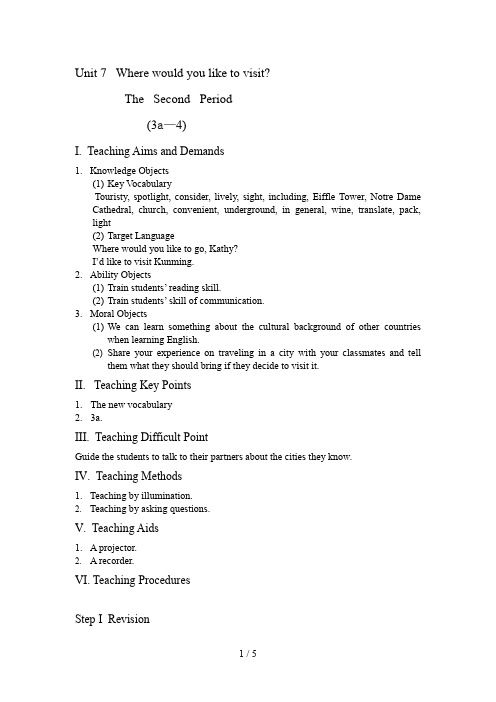
Unit 7 Where would you like to visit?The Second Period(3a—4)I. Teaching Aims and Demands1.Knowledge Objects(1)Key V ocabularyTouristy, spotlight, consider, lively, sight, including, Eiffle Tower, Notre Dame Cathedral, church, convenient, underground, in general, wine, translate, pack, light(2)Target LanguageWhere would you like to go, Kathy?I’d like to visit Kunming.2.Ability Objects(1)Train students’ reading skill.(2)Train students’ skill of communication.3.Moral Objects(1)We can learn something about the cultural background of other countrieswhen learning English.(2)Share your experience on traveling in a city with your classmates and tellthem what they should bring if they decide to visit it.II. Teaching Key Points1.The new vocabulary2.3a.III. Teaching Difficult PointGuide the students to talk to their partners about the cities they know.IV. Teaching Methods1.Teaching by illumination.2.Teaching by asking questions.V. Teaching Aids1. A projector.2. A recorder.VI. Teaching ProceduresStep I Revision1.Revise attributive clause by doing some exercises.Fill in the blanks with who,which,that,whom,whose and where.1)Do you know the girl ___ has long hair?2) I like movies ____ have scary monsters.3) The boy ____ your mother teaches is Tom.4) We are talking about the girl ____ T-shirt is white.5) I often go to Beijing ____ is a beautiful city.6) I like Beijing _____ the food is delicious.2.Revise the target language they learned last class by asking Where would you liketo go on vacation? Show pictures and get several children to answer it.Step II 3a1.Lead-in. Show a picture of France and let the students guess which country it is.After the students answer, the teacher can say, ‘Today let’s go together to learn something about Paris.’2.Show the questions and let the students read 3a.3.Choose several students to answer the questions and check.4.Let the students find out some useful expressions in 3a. And the teacher canexplain some difficult points.5.Read the useful expressions.Step III 3b1.Ask two students to read the sample conversation in Activity 3b.2.Show the pictures of the four cities and let the students model other conversationswith the words given.3.Let the whole class practice in pairs.4.Ask some more pairs to share their conversations with their classmates.Step IV Part 41.Say, First think of a city you know, everyone.2.The teacher can introduce a city to the students and then let the students talk aboutwhat they like and dislike about the cities they write.3.Let them fill in the chart and talk to their partners.Step V Exercise1.Why not ____ (stay) at home?2.I’m considering ____ (speak) French.3.The pen ___ me 50 yuan last week.A. spentB. costC. took4. France has many fantastic sights, i_____Eiffel Tower and Notre Dame Cathedral.5. Shanghai is one of ____ cities in the world.A. beautifulB. more beautifulC. the most beautiful Step VI HomeworkWrite a short passage on the city you talked about in class.Step VII Blackboard DesignUnit 7 Where would you like to visit?Section AThe Second PeriodDalianThings you like: Things you don’t likewonderful beaches too expensive thingslong coast too many carsbig and nice parksthe big museum of different kinds of sea animalsUnit 7 Where would you like to visit?The Second Period(3a—4)园园屯里中学。
UnitWherewouldyouliketovisit教案9
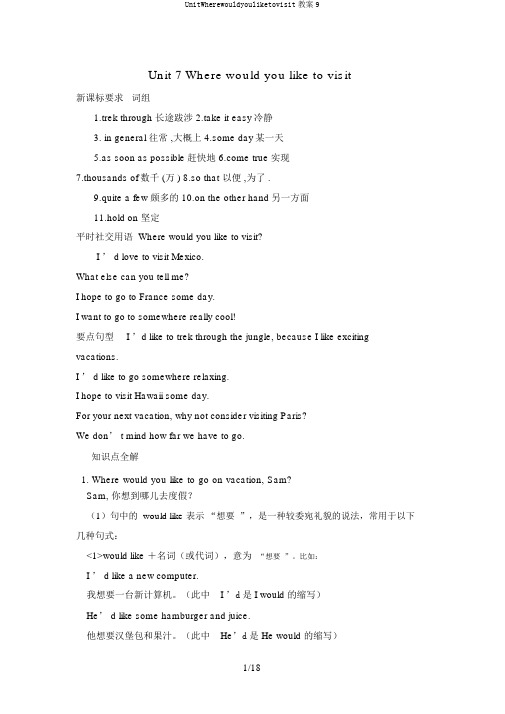
Unit 7 Where would you like to visit新课标要求词组1.trek through 长途跋涉2.take it easy冷静3. in general 往常 ,大概上4.some day某一天5.as soon as possible赶快地e true实现7.thousands of数千 (万 ) 8.so that 以便 ,为了 .9.quite a few 颇多的 10.on the other hand另一方面11.hold on 坚定平时社交用语 Where would you like to visit?I ’ d love to visit Mexico.What else can you tell me?I hope to go to France some day.I want to go to somewhere really cool!要点句型I ’d like to trek through the jungle, because I like exciting vacations.I ’ d like to go somewhere relaxing.I hope to visit Hawaii some day.For your next vacation, why not consider visiting Paris?We don’ t mind how far we have to go.知识点全解1.Where would you like to go on vacation, Sam?Sam, 你想到哪儿去度假?(1)句中的 would like 表示“想要”,是一种较委宛礼貌的说法,常用于以下几种句式:<1>would like +名词(或代词),意为“想要”。
比如:I ’ d like a new computer.我想要一台新计算机。
初三英语 Unit 7 Where would you like to visit.pptx
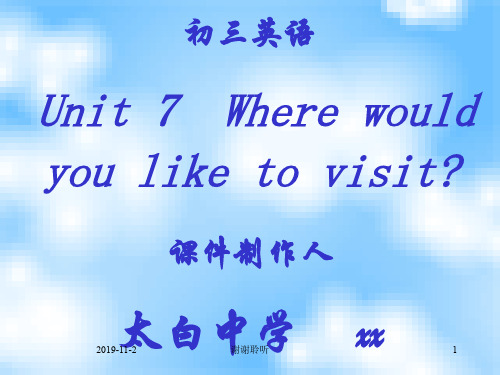
I’d20l1i9k-11e-2 to play bas谢k谢e聆t听ball.
11
Practice:
1. —What are you going to do this Sunday?
—I’d like to ____C_____ some washing.
A. doing B. will do
C. do
D. to do
2. — ___A____ to have dinner with me and my wife sometime next week?
—Yes. I’d like to. Thank you.
A. Would you like B. Do you like C. Would you D. Do you
3. Would you ___C_____ help me?
A. like
B. to like
C. like to
D. want
2019-11-2
谢谢聆听
12
PLANNING YOUR VACATION
2019-11-2
谢谢聆听
13
Listen.
Where would Sam and Gina like to
谢谢聆听
relaxi4 ng
2019-11-2
谢谢聆听
beautifu5 l
2019-11-2
谢谢聆听 fascinatin6 g
2019-11-2
ju谢n谢g聆听le
7
2019-11-2
谢谢聆听
borin8 g
unit7《wherewouldyouliketovisit》知识要点总结(新目标初三)doc初中英语
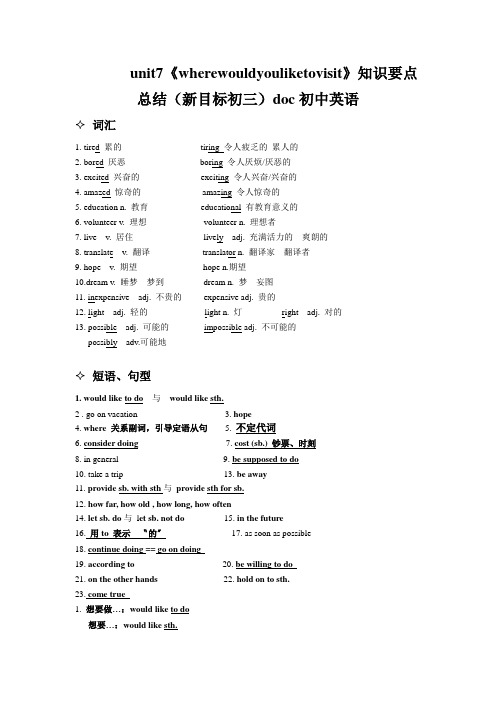
unit7《wherewouldyouliketovisit》知识要点总结(新目标初三)doc初中英语✧词汇1. tired 累的tiring 令人疲乏的累人的2. bored 厌恶boring 令人厌烦/厌恶的3. excited 兴奋的exciting 令人兴奋/兴奋的4. amazed 惊奇的amazing 令人惊奇的5. education n. 教育educational 有教育意义的6. volunteer v. 理想volunteer n. 理想者7. live v. 居住lively adj. 充满活力的爽朗的8. translate v. 翻译translator n. 翻译家翻译者9. hope v. 期望hope n.期望10.dream v. 睡梦梦到dream n. 梦妄图11. inexpensive adj. 不贵的expensive adj. 贵的12. light adj. 轻的light n. 灯right adj. 对的13. possible adj. 可能的impossible adj. 不可能的possibly adv.可能地✧短语、句型1. would like to do与would like sth.2 . go on vacation 3. hope4. where 关系副词,引导定语从句5. 不定代词6. consider doing7. cost (sb.) 钞票、时刻8. in general 9. be supposed to do10. take a trip 13. be away11. provide sb. with sth与provide sth for sb.12. how far, how old , how long, how often14. let sb. do与l et sb. not do 15. in the future16.用to 表示〝的〞17. as soon as possible18. continue doing == go on doing19. according to 20. be willing to do21. on the other hands 22. hold on to sth.23. come true1. 想要做…:would like to do想要…:would like sth.常用的句型有:Where would you like to visit/ go? 你想去哪呢?(本单元的重点句型)What would you like to do?你想要做什么?I would like to visit GuiLin.我想去参观桂林。
UnitWherewouldyouliketovisit教案(00002)
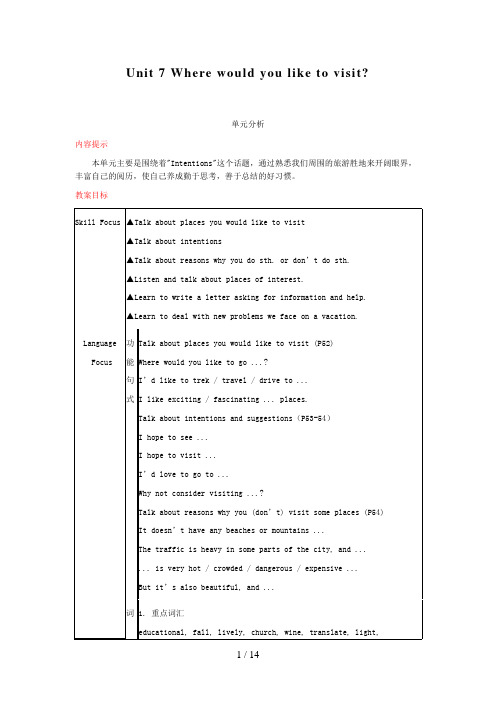
Unit 7 Where would you like to visit?单元分析内容提示本单元主要是围绕着"Intentions"这个话题,通过熟悉我们周围的旅游胜地来开阔眼界,丰富自己的阅历,使自己养成勤于思考,善于总结的好习惯。
教案目标教材分析本单元以Vacations为话题,共设计了四个部分的内容:一、Section A该部分有4个模块:1.第一模块围绕Where would you like to go on vacation? 这一话题展开写( 1a)、听(1b)、说( 1c)训练;2.第二模块围绕the intentions and the difficulties we would meet whentraveling进行听( 2a, 2b)、说( 2c)训练;3.第三模块继续就上两个模块中的travel places这一话题展开训练,训练形式为给出景点特征的形容词或名词,模仿本单元的句型对话( 3a, 3b);4.第四模块是对话训练,通过描述景点的优缺点谈论自己对旅游景点的审美情趣(4)。
二、Section B该部分有4个模块:1.第一模块是词汇或句型复习,谈论的话题是度假时应注意的重要问题(1);2.第二模块给出一段对Jeff的介绍(模拟Jeff在旅游公司工作),谈论旅游中想做的事情和不想做的事情,主要通过听( 2a, 2b)、说( 2c)的方式来练习(表演对话);3.第三模块围绕offer advice to travelers 这一话题展开阅读( 3a)和写作(3b)训练;4.第四模块就an ideal place for a school trip这一话题以口语训练形式展开小组活动(4)。
三、Self Check该部分有2个模块:1.第一模块以填空形式对所学词汇进行训练(1);2.第二模块是借助风景名胜图片展开写作训练,谈谈喜欢或不喜欢某个旅游景点的理由(2)。
UnitWherewouldyouliketovisit()
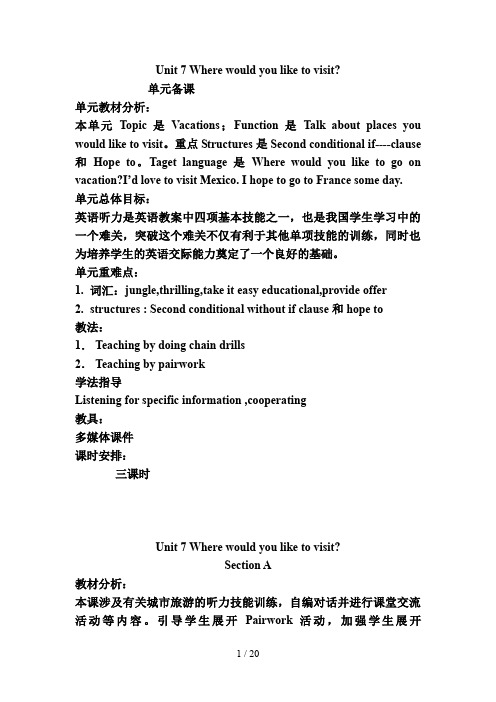
Unit 7 Where would you like to visit?单元备课单元教材分析:本单元Topic是Vacations;Function 是Talk about places you would like to visit。
重点Structures 是Second conditional if----clause 和Hope to。
Taget language 是Where would you like to go on vacation?I’d love to visit Mexico. I hope to go to France some day.单元总体目标:英语听力是英语教案中四项基本技能之一,也是我国学生学习中的一个难关,突破这个难关不仅有利于其他单项技能的训练,同时也为培养学生的英语交际能力奠定了一个良好的基础。
单元重难点:1.词汇:jungle,thrilling,take it easy educational,provide offer2.structures : Second conditional without if clause 和 hope to教法:1. Teaching by doing chain drills2. Teaching by pairwork学法指导Listening for specific information ,cooperating教具:多媒体课件课时安排:三课时Unit 7 Where would you like to visit?Section A教材分析:本课涉及有关城市旅游的听力技能训练,自编对话并进行课堂交流活动等内容。
引导学生展开Pairwork活动,加强学生展开Pairwork活动,让学生实现自主性的学习,进行有目的、有选择的学习活动,从而实现自主性发展。
教案目标:1.Knowledge Objects(1) Key Vocabularytiring, educational, fascinating, thrilling, peaceful, exotic, trek, jungle, take it easy, explore, historic, site(2) Target LanguageWhere would you like to go on vacation?I’d like to trek through the jungle, because I like exciting vacations.2. Ability Objects(1)Train students to talk about places they would like to visit with the target language.(2)Train students to describe vacations with different adjectives.(3)Train students’ listening skill.教案重点1. Key Vocabularytiring, educational, fascinating, thrilling, peaceful, exotic, trek, jungle, take it easy, explore, historic, site2. Terget LanguageTalk about different places with the target language.教案难点1. Describe vacations with different adjectives.2. Talk about different places with the target language.教法1. Teaching by doing chain drills2. Teaching by pairwork学法指导Listening for specific information ,cooperating教具:多媒体课件课时:第一课时教案过程:Step Ⅰ Revision1. Revise the language points in Unit 6.Provides some questions, What kind of music do you like/love/prefer? What kind of clothes/writers/movies/… do you like/love/prefer? Then ask two pairs to make model conversations to the class to make sure they answer, I like/love/prefer music that…I prefer writers who…Next ask students to practise in pairs.Walk around the classroom listening to them, correct some errors they may make and be sure they are answering with sentences with relative clauses.2.Revise the words and expressions in Unit 6 by dictating the following:lyric, remind of, entertainment, exhibition, gallary, on display, energy, suggest, photograph, suitStep Ⅱ 1aThis activity trains students to use the new vocabulary to describe the vacations.At first introduce the key vocabulary.Point to the words and teach the children to read them several times till they can pronounce the words fluently and correctly.After that, try to let students explain the adjectives and make up sentences with them. For example, exciting, do like this:Let’s try to explain some new adjectives in our own words and make up some sentences now. See exciting first. Who can explain it in your own words in English?What does exciting mean?Help the children to explain it. Exciting means not boring, or means hard to be quiet.Who can make up a sentence with it?Give an example sentence with it, please.Ask several ones to say their sentences to the class. For example, Surfing makes us exciting.The boy is very exciting when he is watching a football match.Read the instructions to the students. Be sure that everyone knows what to do.Tell students to look at the posters in the picture and compare them.We can see three posters. Tell me what you can see in each one.Then discuss the three posters with students. For Poster One, help students to say, It is a beach.A man with sunglasses is sleeping, etc.Do the same to the other two posters.Read the words on each poster to students and then let them readtogether several times. Ask some ones to tell the Chinese meanings of the words to see if they can understand them.Do some explanation if necessary.Call the students’ attention to the chart.Point to vacation 1,2 and 3 in the chart.Say, Let’s choose the adjectives from the box for the three vacations.The adjectives you choose should correspond with the posters.Now let’s use Vacation 1 as a sample.Which adjectives should we choose? Who can tell me?Then ask several students to tell the class the words they’ve chosen. Write down their answers on the blackboard like this: Vacation 1 Take it easy on a Florida beach!Adjectives: relaxing, peaceful, boringWho has got some other adjectives to describe it? Some other adjectives you know, but not in the box?Ask some to say more besides the ones in the box, such as quiet, lazy.Write them on the blackboard, too.Please fill in the chart with the adjectives now. Note to match the posters.Get them to fill in the answers by themselves. As they work, move around the room checking their progress and answering questions they may have.Check the answers.Provide the possible answers on the blackboard.Possible answers includeVacation 1: relaxing, peaceful, boringVacation 2: exciting, tiring, dangerous.educational, fascinating, interesting, fun, thrilling, exoticVacation 3: exciting, educational, peaceful, interestingStep Ⅲ 1bThis activity gives students practice in understanding the target language in spoken conversation. Read instructions to students.We’ll listen to three students talking about where they would like to go on vacation and why.See the sample answers in the chart. Write your answers like that while you hear. Look at the three posters in Activity la and do this part. Each one of the three students, Sam, Gina and Lydia, wants to go to one of the three places.Play the tape for the first time, and tell the students not to write in a hurry, just try to catch the main idea of the dialogue.Then play the recording again. Ask them to write their answers this time.Check the answers.Answers1. Sam, Brazil, likes exciting vacations2. Gina, Japan, has been bored lately3. Lydia, Florida, has been stressed outTapescriptBoy 1: Look at those travel posters. I’d love to go on a vacation.Girl 1: Where would you like to go, Sam?Boy 1: I’d love to go trekking in the Amazon jungle in Brazil.Girl 1: Y ou would?Boy 1: Sure. I like exciting vacations.Girl 1: Wouldn’t that be dangerous?Boy 1: No, not really. How about you,Gina? Where would you like to go?Girl 1: Well, I’ve been kind of bored lately.I think I’d like to see the historical sites in Japan.Boy 1: Hmm, that would be fascinating.What about you, Lydia?Girl 2: Oh, I’m stressed out. I’d just like to relax on a beach… Youknow a beautiful beach in Florida.Boy 1: That sounds peaceful.Step Ⅳ 1cThis activity provides guided oral practice using the target language.Presentate this dialogue, showing some pictures of the places with great interest all over the world and say like this:I’d like to travel to France.I’d love to visit Paris, because I like relaxing vacations.Where would you like to go on vacation, Sam?Ask one student to answer the question.After that let him or her ask another student. Set off a chain drill like this:T: I’d love to visit Paris, because I like relaxing vacations. Where would you like to go on vacation, S1?S1:I’d like to climb Mount Emei, because I like dangerous vacations. Where would you like to go on vacation, S2?S s:I prefer to travel to the USA, because I like exotic vacations. Where would you like to go on vacation, S3?S3…After a team finished get the children to make their own conversations in pairs.Ask two students to read the example in the speech bubbles in Activity la. Tell them to talk about the posters with their partners this time.As students work together, move around the classroom, offering language support as needed.Ask some pairs to say their conversations to the class.Step Ⅴ SummaryIn this class, we’ve learned some adjectives that are used to describe vacations and some other words.We have also learned the targetlanguage—Where would you like to go on vacation? I’d like to trek through the jungle because I like exciting vacations.Step Ⅵ Homework1. Try to remember the new key vocabulary.2.Write out three similar conversations to the example in the picture in Activity 1a.信息反馈:在教案活动中,我注意让学生展开听力口语交流活动,创设较为真实或接近真实的语言交际情景,在具体的情景中去引导学生学习是有Target language,基本实现了教案目标。
- 1、下载文档前请自行甄别文档内容的完整性,平台不提供额外的编辑、内容补充、找答案等附加服务。
- 2、"仅部分预览"的文档,不可在线预览部分如存在完整性等问题,可反馈申请退款(可完整预览的文档不适用该条件!)。
- 3、如文档侵犯您的权益,请联系客服反馈,我们会尽快为您处理(人工客服工作时间:9:00-18:30)。
Unit 7 Where would you like to visit? 学案Ⅰ单词1.引起疲劳的;累人的2.教育的;有教育意义的3.平静的;和平的4.迷人的;有极大吸引力大的5.令人激动的6.(缓慢或艰难的)旅行;长途跋涉7.热带丛林8.瀑布9.游客很多的;适合游览的10.公众注意的中心11.考虑;思考;认为12.充满活力的;活泼的13.名胜;风景14.包含;包括15.塔;塔楼16.教堂17.便利的;方便的18.地下的19.一般事物;一般原则20.葡萄酒21.翻译v._______翻译员n._____22.把……打包;把……装箱23.轻的§1.东部的2.提供;供应3.公司4.地点;场所§1.航行;在……航行2.太平洋3.发现;调查的结果n.4.继续;坚持下去5.编程n.6.报道;报告7.乐意的;心甘情愿的8.做梦v./梦想n.9.爱好运动的人;运动员10.结论11.态度Ⅱ短语1.跋涉于热带丛林中____________________2. 从容;轻松;不紧张____________3.去度假____________4.某一天____________5.通常;一般而言____________6.应该____________7.迷人的海滩____________8.迷人的风景____________9.最活跃的城市____________10.乘地铁____________§11.旅行____________ 12.向某人提供些信息____________13.许多户外活动____________14.一家不贵的旅馆____________15.攒钱;省钱____________16.离开____________17.一年的这个时候____________18.去非洲度假____________§19.梦想着……____________20.数以千计的学生____________21.全中国____________22.参加____________23.问题的答案____________24.完成你的学业后(毕业后)________________ 25.尽快;尽早_________________26.以至于________27.最受欢迎的职业选择____________28.各种各样__________ 29.根据调查____________30.愿意做某事____________31.实现梦想____________32.横渡太平洋____________33.另一方面____________34.坚持____________35.实现____________36.与……不同____________37.将来____________Ⅲ句子Section A1.你愿意去哪里度假?2.我想要穿越丛林,因为我喜欢刺激的假期。
3.我朋友喜欢天气总是温暖的地方。
4.我希望有一天去游览巴黎。
5.为什么不考虑游览长城?6.北京市中国的首都。
7.香港是世界上最活跃的城市之一。
8.乘地铁去大多数地方很方便。
9.坐出租车游览巴黎会花费很多。
10.除非你自己说法语,否则,你最好带个翻译。
Section B1.今年夏天,我愿意去个暖和点地方度假。
2.你还能告诉我一些别的吗?3.我希望你能提供些关于你们学校的信息。
4.房间大小需要够三个人住。
5.我们想要离开大约三个星期。
6.你愿意来吃晚餐吗?7.我们可以通过自己做饭来省钱。
8.请你给我些关于度假场所的建议,好吗?9.昆明应该很热,不是吗?10.我们想要呆在一个不贵的旅馆。
Reading1.来自全国数以千计的学生参加了这个调查。
2.我们收到这个问题的几个不同答案。
3.毕业之后你想要做什么?4.一些学生想要尽早开始工作。
5.他每天起得很早,以便于能赶上第一班车。
6.青少年拥有各种各样的梦想。
7.他们梦想着有一天到月球去。
8.我们愿意为实现梦想而努力。
9.大多数学生希望受到好的教育并找到好的工作。
10.坚持我们的梦想很重要。
Ⅳ知识要点Section A1.Would like = want → would like sth/ would like todo/ would like sb. to do①________________________. 你想要什么?②_________________________你想要喝点什么?③______________________________我父母想要我将来当医生。
2.tire 使……疲惫v. → ____________/_________ adj.This is a _____________ journey. We are all__________.3.through 从物体内部穿过(森林、窗户)across 从马路等物体表面穿过 Be careful when you go _________ theroad./ The sunlight is coming in _________ the window.The room is quite warm.4.hope → hope to do /hope that eg. ①I hope ________Paris one day.(visit) ② I hope he ___________ to myparty this Sunday.(come)5.some day 将来的某一天 one day 过去的或将来的某一天6.consider → consider doing7.trek → _________/________(过去式、过去分词)__________(现在分词)cate 教育v.→______________ n. →______________adj.9.peace n. 和平→ ___________ adj.10.fascinate v. 深深吸引;迷住→________________/____________ adj.11.thrill v. 激动;兴奋→ _____________/___________ adj.→ _________惊险小说(电影)12.fall 落下;掉落/ 秋天/瀑布 eg. The leaves_________from the trees in _________. /Niagara________ are very famous in the world./ 短语:睡着________落后________ 从……掉下 ________ 掉到……里________喜欢上;爱上 ______ ①He _____________the bike and hurt his knees. ②If you don’t studyhard, you’ll _____________others. ③He is so tiredthat he _____________ soon.④If you come to Dandong,you’ll ________________ this beautiful city.13.translate v. → ______________ n. → ____________翻译者__________the bike and hurt his knees. If youdon’t study hard, you’ll ___________others.14.tour n./ v. a sightseeing tour观光旅游 a tour guide导游→__________ n.(游客) → ________ adj. (游客多的;吸引很多游客的)15.live / /v.①住,居住;生活,过日子;生存,活着→ eg.We ________ in Dandong./ He ________ a happy lifewith his family./ We can’t _________ without water.②lively / / adj.充满活力的③ life / / n. →lives (pl.)生命;生活16.be supposed to do 应该做某事 ___________________ ontime.(你应该按时完成作业。
)Section B1.方位词:东_______ 西_______南_______北_______ 东北__________西北___________东南___________西南___________东部的__________西部的__________南部的___________北部的_________2.what else = what other things3.provide → provide sb. with sth.= provide sth. for sb.4.save 储蓄;节约;挽救→存钱___________节约用水___________救某人的命___________5.advice (un.)→ _______________(一条建议)/ suggestion(cn.) _______________(一些建议)6.be away 离开表状态,与时间段连用; leave 离开,与时间点连用 eg. He ____________ Shanghai two days ago.=He ______________ from Shanghai for two days.7.Could you please do…?Reading1.continue→continue doing2.quite a few 相当多;不少3.dream of / about + n. /doing4.willing → _________(反义词)5.attitude → the attitude to/ towards对……的态度6.It seems that7.so that因此;为了He worked hard every day so thathe could pass the exam easily./ He gets up early sothat he can catch the first bus.So … that 如此……以至于 He is so young that hecan’t go to school.。
